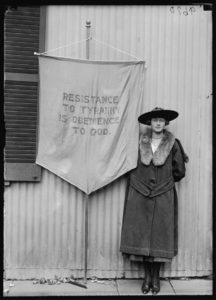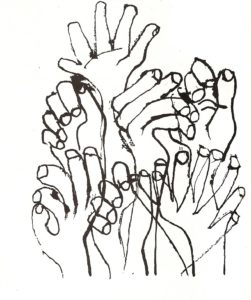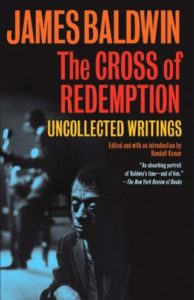Lead on.
August 2, 2019On the centennial of the Nineteenth Amendment’s passage, it is worth considering what suffragists were fighting for, why they had to fight so hard, and who, exactly, was fighting against them.
-Margaret Talbot, The New Yorker
The Imperfect, Unfinished Work of Women’s Suffrage
A century after the passage of the Nineteenth Amendment, it’s worth remembering why suffragists had to fight so hard, and who was fighting against them.
In 1872, Susan B. Anthony’s attempt to vote and her subsequent arrest got the lion’s share of publicity, but Ware uses a carte de visite of the black activist Sojourner Truth to tell the story of how she, too, tried to vote in the Presidential election that year. A cookbook published as a fund-raiser by the Washington Equal Suffrage Association leads Ware to the story of one of its contributors, Cora Smith Eaton King, a physician and avid climber, who, with a recreational group called the Mountaineers, planted a “Votes for Women” banner at the summit of Mt. Rainier. Ware prefaces a reading of Charlotte Perkins Gilman’s feminist writings with a photograph of Gilman’s death mask, whose ghostly visage haunts a discussion of her lesser-known anti-immigrant and pro-eugenics politics. Alongside a front page of the Woman’s Exponent, one of the first women’s-media outlets west of the Mississippi—it was published, in Salt Lake City, from 1872 until 1914—Ware recounts the life of a contributor, Emmeline Wells, who advocated on behalf of women’s rights and the Mormon doctrine of plural marriage. (“Polygamy gives women more time for thought, for mental culture, more freedom of action, a broader field of labor,” she wrote.) A ballot box from Illinois appears with an account of the pioneering black women’s Alpha Suffrage Club, whose founder, the investigative journalist Ida Wells-Barnett, forcibly integrated the Woman Suffrage Procession—the original Women’s March—in 1913, after her white colleagues tried to segregate their protest of Woodrow Wilson’s Inauguration. “Either I go with you or not at all,” Wells-Barnett declared.
“I am not taking this stand because I personally wish for recognition. I am doing it for the future benefit of my whole race.”
The idea that women were always going to get the right to vote in the United States ignores the reality that they only got that right in Switzerland in 1971 and in Saudi Arabia in 2015. It also fails to explain why the right was granted to American women in 1920, as opposed to 1919 or 1918, or, perhaps more pointedly, 1776. Worse, the feeling of inevitability also conveys a sense of irreversibility, as if history always advances, and never stalls, or regresses.
Disenfranchisement can take many forms, and its most insidious manifestations are regrettably common: purging voter rolls, passing voter-identification requirements, understaffing or closing polling places, gerrymandering voting districts. Under the circumstances, perhaps the best way to celebrate the anniversary of the passage of the Nineteenth Amendment is to remember all those who cannot vote, not only those who can. ♦
https://www.newyorker.com/magazine/2019/07/08/the-imperfect-unfinished-work-of-womens-suffrage
‘To do the right and love goodness.’
You have been told . . . what is good
And what the Lord requires of you:
Only to do the right and to love goodness,
And to walk humbly with your God. (Micah 6:8)
╭ღ╯
“It has always been much easier (because it has always seemed much safer) to give a name to the evil without than to locate the terror within.”
“We ought to try, by the example of our own lives, to prove that life is love and wonder and that that nation is doomed which penalizes those of its citizens who recognize and rejoice in this fact.”
Timeliness from Baldwin, born on this day in 1924.
“I can conceive of no better service,” Walt Whitman wrote, “than boldly exposing the weakness, liabilities and infinite corruptions of democracy.” Nearly a century later, James Baldwin (August 2, 1924–December 1, 1987) — another poet laureate of the human spirit — embodied this ethos in one of his shortest, most searing, and timeliest essays.
“We are living through the most crucial moment of our history, the moment which will result in a new life for us, or a new death… a new vision of America, a vision which will allow us to face, and begin to change, the facts of American life… This seems a grim view to take of our situation, but it is scarcely grimmer than the facts. Our honesty and our courage in facing these facts is all that can save us from disaster. And one of these facts is that there has always been a segment of American life, and a powerful segment, too, which equated virtue with mindlessness… It always reminds me of a vast and totally untrustworthy bomb shelter in which groups of frightened people endlessly convince one another of its impregnability, while the real world outside — by which, again, I mean the facts of our private and public lives — calmly and inexorably prepares their destruction.”
“We must dare to take another view of majority rule… taking it upon ourselves to become the majority by changing the moral climate. For it is upon this majority that the life of any nation really depends.”


